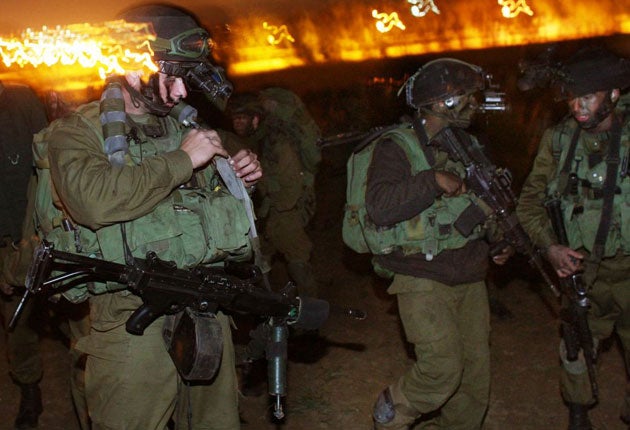Gaza sliced in two by Israel's land assault
Diplomacy falters as divisions widen between Europe and America

Israel yesterday used tanks, artillery and warplanes to mount a massive offensive in Gaza which local medics said had killed at least 31 Palestinian civilians by dusk. The Israeli forces divided the Gaza Strip in two, from the eastern border to the Mediterranean, and began to cut off the main city from the rest of the territory.
With some neighbourhoods in Gaza coming under intensive shelling and aerial bombardment as Israel intensified its pursuit of Hamas militants, one Israeli soldier was killed, the first in the eight-day assault which has brought the estimated total Palestinian death toll to 512. The UN calculates that more than a quarter of these are civilians. Another 31 Israeli soldiers were wounded, three critically, in the day-old ground attack.
The co-ordinated offensive cut through the two main north-south roads, worsening an already rapidly mounting humanitarian crisis with UN officials and Israeli human rights agencies reporting electricity cut to 75 per cent of the Strip, hospitals overwhelmed, many ambulances unable to reach casualties, and food distribution halted from a number of key centres.
Residents in areas under fire – for example in northern Gaza where the Israeli military focused a major incursion around the towns of Beit Lahiya, Jabaliya and Beit Hanoun – were prevented from leaving the besieged territory. The UN Relief and Works Agency reported that 3,000 internally displaced Gazans had arrived at seven shelters around the Strip. Oxfam said last night that a paramedic from an ambulance service it funds was killed in Beit Lahiya and two other medics injured while trying to evacuate an injured person. The ambulance had been shelled, Oxfam said.
The Israeli military said that in exchanges of fire during the day it had hit "dozens of Hamas gunmen" – including three of the movement's senior commanders, two of whom were directly linked to the firing of longer-range rockets into Israel. The Israelis said they launched 15 air attacks on Hamas rocket-launching sites and squads, and that 30 rockets had been fired by Gaza militants at Israel. Military officials said the main Hamas resistance had been from mortar fire and improvised explosive devices on roads rather than from shooting in the streets. Reinforcing the Israeli government's earlier rejection of international ceasefire calls, Israel's veteran President Shimon Peres told the US news network ABC: "We don't intend either to occupy Gaza nor to crush Hamas, but to crush terror. And Hamas needs a real and serious lesson. They are now getting it."
Yesterday's deaths followed the worst single group of civilian casualties on Saturday night, just before the ground offensive, when 15 Palestinians were killed and more than 25 were injured in the bombing of the Ibrahim Al Makadima Mosque in Beit Lahiya. The Israeli military has not yet produced an official explanation of the incident, though officials said that two Hamas gunmen outside the mosque had been targeted and that the attack on them had triggered "secondary explosions".
More generally, the Israeli military held Hamas "solely responsible" for the rapidly rising civilian death toll, and said that Hamas was using civilians as "human shields". It added: "We call on all civilians to keep away from rocket-launching grounds."
Israeli Prime Minister Ehud Olmert told the cabinet yesterday: "This morning I can look every one of you in the eyes and say the government did everything before deciding to go ahead with the operation. This operation was unavoidable." Ismail Radwan, a spokesman for Hamas said on Hamas's al- Aqsa TV station, directing his message at Israeli soldiers: "You entered like rats. Gaza will be a graveyard for you."
Tensions have surfaced for the first time between the US, which is insisting on a "durable and sustainable" ceasefire, and Britain, where Gordon Brown reiterated his desire for an "immediate" truce yesterday. US Vice-President Dick Cheney appeared on television implying that Washington had effectively given Israel a green light to take down Hamas before the Obama administration could make any changes to US policy in the Middle East. But he said Israel "didn't seek clearance or approval from us", before the ground offensive.
Mr Olmert ignored a personal appeal from Mr Brown who spoke to him on Saturday about ending the fighting. His spokesman has said: "I don't detect much criticism from Berlin, Paris, and London about hitting Hamas targets. What there is concern about is the humanitarian situation."
Additional reporting by Anne Penketh and Leonard Doyle
Join our commenting forum
Join thought-provoking conversations, follow other Independent readers and see their replies
Comments